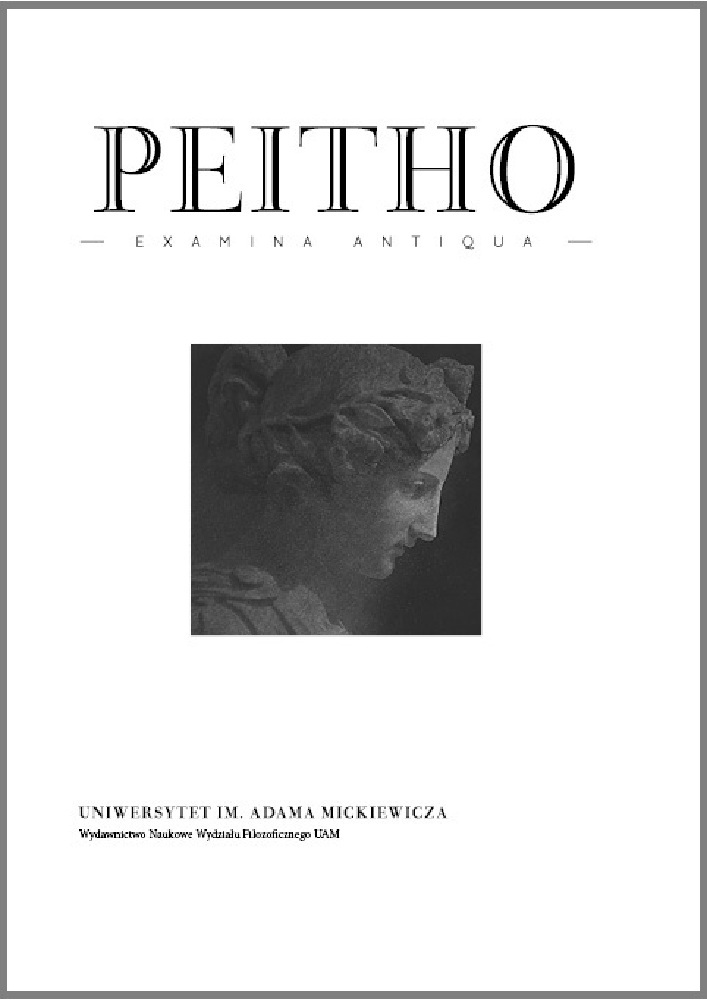Abstract
The aim of this paper is to highlight the decisive contribution of Simplicius and Philoponus to the resolution of the problem of evil in Neoplatonism. A correct and faithful interpretation of the problem, which also had to agree with Plato’s texts, became particularly needed after Plotinus had identified evil with matter, threatening, thus, the dualistic position, which was absent in Plato. The first rectification was made by Proclus with the notion of parhypostasis, i.e., “parasitic” or “collateral” existence, which de-hypostasized evil, while at the same time challenging the Plotinian theory that turned evil into a principle that was ontologically opposed to good. In light of this, the last Neoplatonic exegetes, Simplicius and Philoponus, definitely clarified the “privative” role of kakon, finally relieving matter from the negative meaning given to it by Plotinus and restoring metaphysical monism.
References
Brennan, T., Brittain, C. (transl.), 2014, Simplicius, On Epictetus Handbook 27–53, London.
Des Places, E. (ed.), 1973, Numénius, Fragments, Paris.
Festugière, A. J. (trad.), 1970, Proclus, Commentaire sur la République, vol. 1–3, Paris.
Hadot, I. (trad.), 2001, Simplicius, Commentaire sur le Manuel d’Epictète, Paris.
Isaac D. (trad.), 2003, Proclus, Trois études sur la providence. De l’existence du mal, Paris.
Montoneri, L. (cur.), 1986, Proclo, La provvidenza e la libertà dell’uomo, Roma–Bari.
Narbonne, J.-M. (trad.), 1993, Plotin, Les deux matières (Ennéade II 4 [12]), Paris.
Opsomer, J., Steel, C. (transl.), 2003, Proclus, On the Existence of Evils, London.
Saffrey, H. D., Westerink, L. G. (trad.), 1968–1997, Proclus, Théologie platonicienne, vol. 1–6, Paris.
Bonazzi, M., 2015, “Numenio, il platonismo e le tradizioni orientali”, Chôra 15 (Dualismes), pp. 225–240.
Cardullo, R. L., 2014, Considerazioni sul male nel Commentario alla Metafisica di Asclepio. Contro Aristotele e in difesa dell’unicità del Primo Principio, in: R. L. Cardullo, D. Iozzia (cur.), Kallos kai arete. Bellezza e virtù. Studi in onore di Maria Barbanti, Acireale–Roma, pp. 551–556.
Cardullo, R. L., 2017, Evil as alogon in the post-Plotinian Neoplatonism. Again on the Uniqueness of the Principle between Athens and Alexandria, in: R. L. Cardullo, F. Coniglione (eds.), Reason and no-Reason from Ancient Philosophy to Neurosciences. Old Parameters, new Perspectives, Sankt Augustin, pp. 47–63.
De Haas, F. A. J., 1997, John Philoponus’ New Definition of Prime Matter: Aspects of its Background in Neoplatonism and the Ancient Commentary Tradition, Leiden.
Gavray, M. A., 2015, “Revue” à Ph. Soulier, Simplicius et l’infini, Paris 2014, Revue de philosophie ancienne 33, pp. 115–128.
Golitsis, P., 2008, Les Commentaires de Simplicius et de Jean Philopon à la Physique d’Aristote, Berlin–New York.
Hadot, I., 2014, Le néoplatonicien Simplicius à la lumière des recherches contemporaines. Un bilan critique, Sankt Augustin.
Hadot, I., 2015, Athenian and Alexandrian Neoplatonism and the Harmonization of Aristotle and Plato, Leiden–Boston.
Lloyd, A. C., 1987, Parhypostasis in Proclus, in: G. Boss, G. Seel (eds.), Proclus et son influence. Actes du Colloque de Neuchâtel, juin 1985, Zürich, pp. 145–157.
Opsomer, J., 2001, “Proclus vs Plotinus on Matter (De mal. Subs. 30–37)”, Phronesis 46, pp. 154–188.
Opsomer, J., 2007, “Some Problems with Plotinus’ Theory of Matter-Evil. An ancient Debate continued”, Quaestio 7, pp. 165–189.
O’Meara, D., 1997, “Das Böse bei Plotin (Enn. I,8)”, in: T. Kobusch, B. Mojsisch (hrsg.), Platon in der abendländischen Geistesgeschichte. Neue Forschungen zum Platonismus, Darmstadt, pp. 33–47.
O’Meara, D., 2005, “The Metaphysics of Evil in Plotinus: Problems and Solutions”, in: J. Dillon (ed.), Agonistes. Essays in Honour of Denis O’Brien, Aldershot, pp. 179–185.
O’Meara, D., 2015, “Explaining Evil in Justinian’s Reign: Simplicius and Procopius”, in: J. Halfwassen, T. Dangel, C. O’Brien (eds.), Seele und Materie im Neuplatonismus/Soul and Matter in Neoplatonismus, Heidelberg, pp. 279–290.
Salis, R., 2014, Luogo, vuoto e movimento a distanza in Giovanni Filopono, Lecce.
Trizio, M., 2014, “A late antique Debate on Matter-Evil revisited in 11th-Century Byzantium. John Italos and his Quaestio 92”, in: P. d’Hoine, G. Van Riel (eds.), Fate, Providence and moral Responsability in ancient, medieval and early modern Thought. Studies in Honour of Carlos Steel, Leuven, pp. 383–394.
Jourdan, F., 2013, “La matière à l’origine du mal chez Numénius. Un enseignement explicité chez Macrobe”, Revue de philosophie ancienne 31, pp. 41–87, 149–178.
Jourdan, F., 2014, “La matière à l’origine du mal chez Numénius”, Philosophie Antique 14, pp. 185–235.
Sorabji, R. (ed.), 20102, Philoponus and the Rejection of Aristotelian Science, London.
Verrycken, K., 1990, “The Development of Philoponus’s Thought and Its Chronology”, in: R. Sorabji (ed.), Aristotle Transformed. The Ancient Commentators and their Influence, London, pp. 233–274.
Wildberg, C., 1999, “Impetus Theory and the Hermeneutics of Science in Simplicius and Philoponus”, Hyperboreu 5, pp. 107–124.
License
Peitho provides immediate open access to its content on the principle that making research freely available to the public supports a greater global exchange of knowledge.
